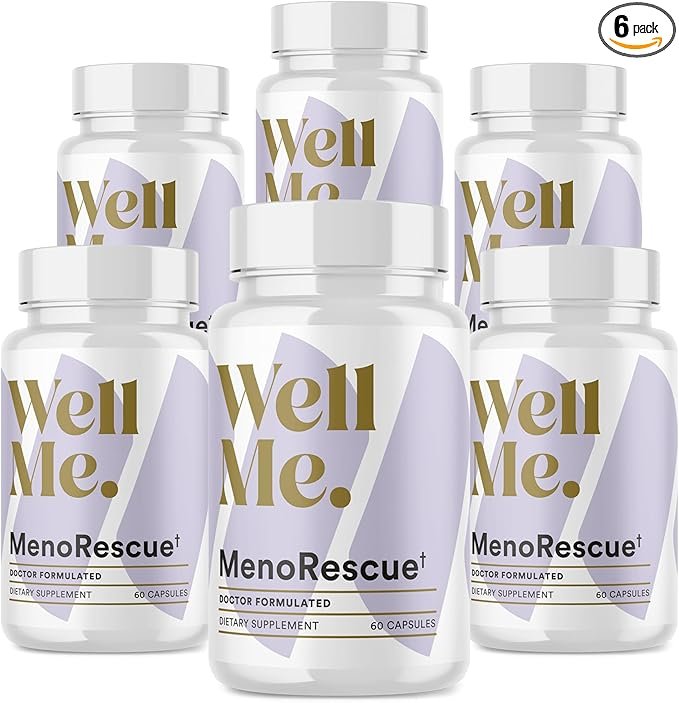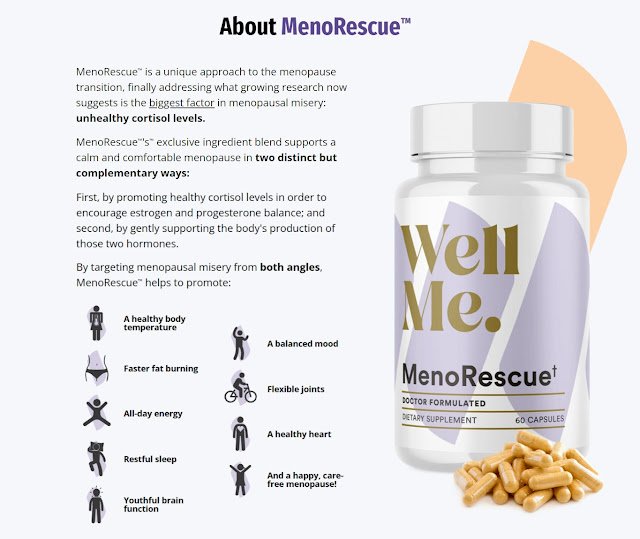
Menopause, a natural transition for women, often brings a cascade of symptoms that can significantly impact quality of life. From hot flashes and night sweats to mood swings and weight gain, these challenges stem primarily from hormonal imbalances. While hormone replacement therapy (HRT) is an option, many women seek natural alternatives to navigate this phase.
This comprehensive guide delves into the complexities of menopause, exploring the root causes of its symptoms, and offering a range of strategies for relief. We’ll also examine the potential benefits of MenoRescue, a supplement designed to support hormonal balance during this transformative period.

Understanding the Menopause Journey
Menopause marks the end of a woman’s reproductive years, typically occurring between the ages of 45 and 55. This stage is characterized by a decline in estrogen and progesterone production, two hormones vital for regulating menstrual cycles, mood, sleep, and bone health.
As estrogen levels dwindle, women often experience a host of symptoms, including:
- Hot flashes and night sweats: Sudden feelings of heat and sweating.
- Vaginal dryness: Discomfort during intercourse.
- Mood swings and irritability: Emotional fluctuations.
- Sleep disturbances: Difficulty falling asleep or staying asleep.
- Weight gain: Changes in metabolism and body composition.
- Decreased libido: Reduced sexual desire.
- Joint and muscle aches: Common physical discomfort.
Beyond estrogen, progesterone also plays a crucial role in overall well-being. A decline in progesterone can contribute to sleep disturbances, anxiety, and mood swings.
The Impact of Cortisol: A Hidden Factor
While estrogen and progesterone are the primary hormones associated with menopause, cortisol, the body’s stress hormone, also plays a significant role. Chronic stress can elevate cortisol levels, which can further disrupt estrogen and progesterone balance, exacerbating menopause symptoms.
Navigating Menopause Naturally: A Holistic Approach
A comprehensive approach to managing menopause symptoms often involves a combination of lifestyle modifications, dietary adjustments, and potential supplementation.
Prioritizing a Balanced Diet
Nutrition plays a pivotal role in supporting hormonal balance. Incorporate the following into your diet:
- Whole foods: Emphasize fruits, vegetables, whole grains, and lean proteins.
- Healthy fats: Include sources like avocados, nuts, and seeds for hormone support.
- Cruciferous vegetables: Broccoli, cauliflower, and Brussels sprouts contain phytoestrogens, plant compounds with weak estrogenic effects.
- Fiber-rich foods: Aid in estrogen metabolism and overall digestive health.
- Limit processed foods, sugar, and alcohol: These can contribute to hormonal imbalances.
The Power of Exercise
Regular physical activity offers numerous benefits, including stress reduction, weight management, and improved mood. Aim for at least 30 minutes of moderate-intensity exercise most days of the week.
Managing Stress: A Cornerstone of Well-being
Chronic stress can exacerbate menopause symptoms. Incorporate stress-management techniques into your routine:
- Mindfulness and meditation: Cultivate inner peace and reduce stress.
- Deep breathing exercises: Promote relaxation and oxygenation.
- Yoga and tai chi: Gentle physical activity with mental benefits.
- Sufficient sleep: Prioritize quality sleep to support overall well-being.
The Role of Sleep
Sleep is essential for hormone regulation and overall health. Create a sleep-conducive environment, establish a consistent bedtime routine, and limit screen time before bed.
Exploring Natural Supplements
Some women find relief through natural supplements. Popular options include:
- Black cohosh: Traditionally used to alleviate hot flashes and night sweats.
- Red clover: Contains phytoestrogens that may help with menopausal symptoms.
- Soy isoflavones: Plant-based compounds with weak estrogenic effects.
- St. John’s wort: May improve mood and reduce anxiety.
Important Note: Always consult your healthcare provider before starting any new supplements, as they may interact with medications or have other side effects.

MenoRescue: A Closer Look
For women seeking additional support, MenoRescue, a supplement from WellMe, offers a potential solution. It claims to address menopause symptoms by supporting hormone balance and promoting cortisol regulation.
Key Ingredients:
- Sensoril (ashwagandha): Known for its adaptogenic properties, helping manage stress and potentially improve sleep.
- Greenselect Phytosome (green tea extract): Offers antioxidant benefits and may support weight management.
- Rhodiola rosea: An adaptogen that can help with stress, fatigue, and mood.
- Schisandra berry: Traditionally used in Chinese medicine for overall well-being.
- Sage leaf: May help reduce hot flashes and night sweats.
- Red clover: Contains phytoestrogens.
- Black cohosh: Traditionally used for menopausal symptoms.
- Chasteberry: May support progesterone levels.
- BioPerine (black pepper extract): Enhances the absorption of other ingredients.
How MenoRescue Works:
MenoRescue aims to support hormonal balance through a two-step process:
- Promoting healthy cortisol levels: By addressing stress, it may indirectly influence estrogen and progesterone balance.
- Supporting hormone production: The formula includes ingredients that may help the body produce estrogen and progesterone.
Potential Benefits:
- Reduced hot flashes and night sweats
- Improved mood and sleep
- Increased energy levels
- Weight management support
- Enhanced overall well-being

Important Note: While MenoRescue shows promise, individual results may vary. It’s essential to consult your healthcare provider to determine if it’s suitable for you.
Finding the Right Approach
Managing menopause symptoms is a personal journey. What works for one woman may not work for another. Consider a combination of lifestyle changes, dietary adjustments, stress management techniques, and potential supplementation to find the best approach for you.
If you’re experiencing severe or persistent symptoms, consult your healthcare provider for further evaluation and guidance.
Disclaimer: This information is intended for general knowledge and informational purposes only, and does not constitute medical advice. Always consult your healthcare provider for any health concerns or before starting any new treatment or supplement.
